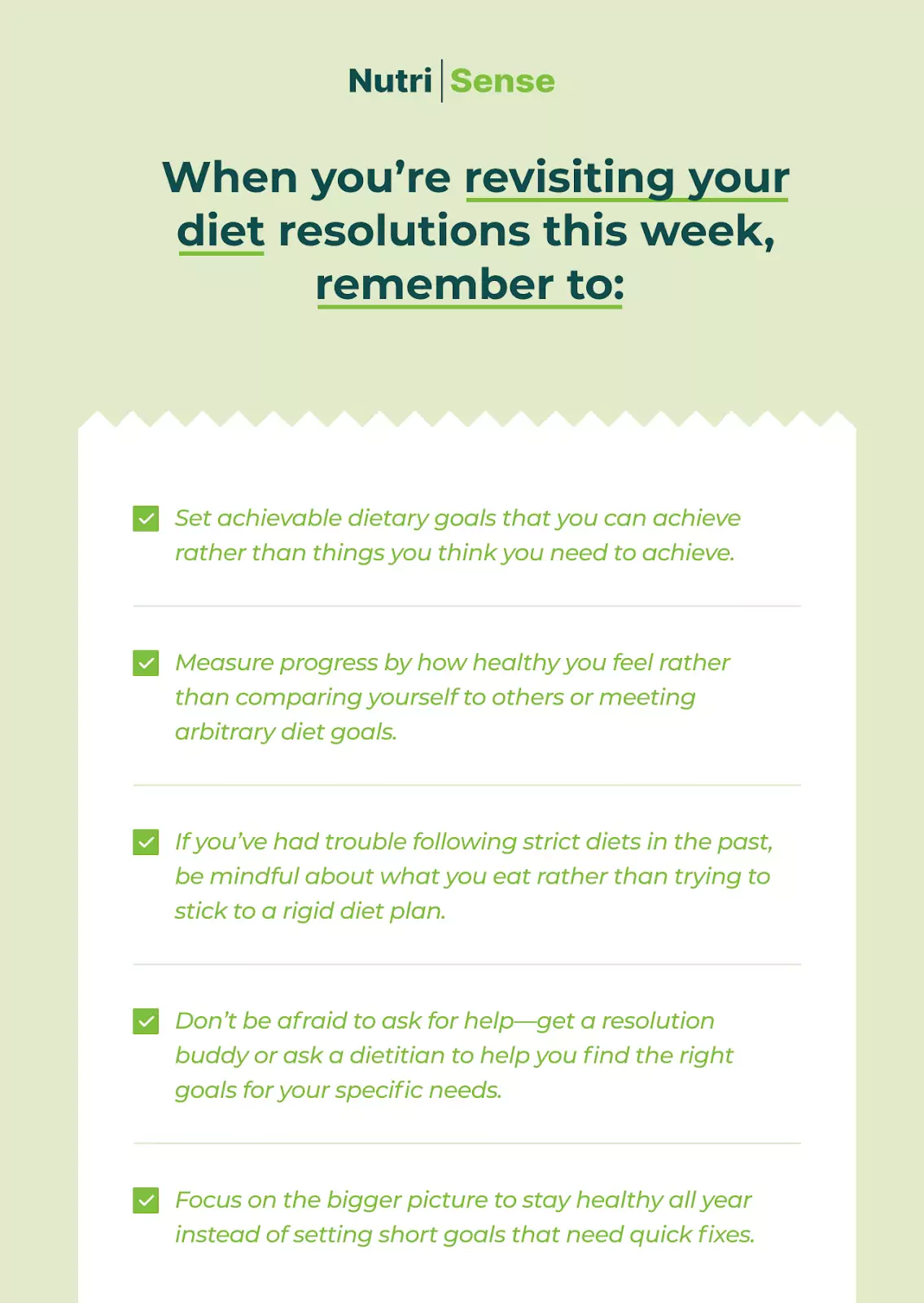10 Health Mistakes That are Ruining Your Diet Resolutions

Key Takeaways
Happy New Year! Have you made your resolutions yet? If you have, there are likely some health goals on there! Exercising and sticking to weight loss goals may be the most common resolutions for adults in the US, but how many people stick to their resolutions throughout the year? Not many, according to most estimates.
Wondering how to avoid becoming just another statistic of this year’s resolution fails? Since this week is Diet Resolution Week, one way to make sure you’re on the right track is to seize the moment to revisit all your goals. Feeling guilty about all the indulgences over the holidays may have led you to set some unachievable (and maybe even unnecessary) goals. Now that the dust has settled on all the celebrations, here are some tips and tricks to ensure you’re on the right track.
Does Anyone Stick to Resolutions?

According to one study carried out on the US population for 15-years, there is a spike in diet-specific recipe searches in January that gradually declines over the following months. It’s at its worst during the holidays, which may explain the uptick in January!
So, why do so many people find it challenging to stick to a dietary regime? There’s no one answer here since multiple factors trigger this inability to stick to diet resolutions, and it also varies from person to person.
There’s no one-size-fits-all diet, there’s no one technique that will work for everyone, and making blanket dietary resolutions without focusing on your individual needs may be one of the reasons for this. Read on to find out what mistakes to avoid so you have a better chance of sticking to your goals beyond this week.
Mistakes That Can Derail Your Resolutions

Are you worried about that slice of cake derailing your health goals this year? Can’t bear the sight of one more bland salad at lunch? Your diet resolutions don’t have to be restrictive and boring.
Our registered dietitians will tell you that being healthy doesn’t mean cutting everything you enjoy out of your diet, and it’s about finding foods and habits that work best for your individual needs and preferences. Other health mistakes can also make it tougher to stick to a diet or meet a health goal.
From not getting enough sleep to forgetting about hydration, there are things you could be doing to ruin your resolutions before you begin them! If you want to help yourself stick to your goals, it’s best to steer clear of these 10 common mistakes:
1. Putting Yourself in a Box
The first and perhaps most common issue is restricting yourself too much. Your diet resolutions should be personal and adjusted according to how much you can handle at a given time. So what if your neighbor lost all her holiday week from a one-week cleanse? Even if you know a particular plan will work for you, but you find the thought of it overwhelming, you’re not likely to stick with it through the year.
So, the first thing to do this week is to be honest with yourself. What are you ready to do? Is cutting down on some added sugars and eating a few more whole foods a good goal for you? Can you handle adding a little more protein to every meal? Start slow, and you’ll be surprised at how much you can achieve.
2. Binge & Purge Snacking Habits

You don’t have to cut out snacking altogether. And eating small meals throughout the day can keep your glucose levels stable for some people. But focus on what you’re eating and when you’re eating it. One way to derail your diet resolutions is to restrict yourself from snacking altogether. Craving some potato chips? Instead of ending up in a guilty binge and purge cycle, try eating them earlier in the day, in moderation. A few minor adjustments can get you closer to your goals than trying to cut all your unhealthy habits out all at once.
It’s also a good idea to understand why you’re craving these foods. Do you snack most when you’re dehydrated? Are your resolutions themselves leading to stress-eating habits? Start noting down whenever you crave unhealthy food so you can track what’s causing this rather than trying to make instant adjustments.
{{rich-text-cta-wl1="/style-guide"}}
3. Obsessing Over Your Weight
Your weighing scale is not a good gauge of your health. Just like being over a certain weight doesn’t mean you’re unhealthy, being underweight doesn’t mean you’re healthy—in fact, it often points to the opposite.
Since size doesn’t dictate your metabolic health, stop looking at the numbers on your weighing scale and look for other parameters when finalizing your diet resolutions. Ask yourself what you really need from a diet resolution apart from weight loss (which, if healthily done, can be a perfectly reasonable goal too!), and how you can achieve it.
Your goal should always be to stay healthy, so customize your diet resolutions to your specific body rather than an arbitrary number on your weighing scale.
4. Opting for a Quick-Fix Diet

Even if you’ve determined that your goal is to lose excess weight, set a manageable yearly target. Falling into the trap of quick-fix diet and exercise routines to lose weight are unlikely to work, and you’ll have more trouble sticking to them!
Instead, work with a dietitian or healthcare professional to target a meaningful but reasonable amount of weight loss with a diet that nourishes and fuels you rather than resorting to one-size-fits-all diets that may strip you of your body’s nutrients needs.
5. Cutting Down Food Portions Drastically
Sure, meal portioning and calorie counting can be a good idea. And intermittent fasting works well for some people too. But simply starving yourself in an attempt to lose weight won’t help! If your diet resolutions involve losing weight, undereating is not the best way to go about them.
Restricting the food you eat can lead to health issues and slow down your metabolism, which won’t help you lose weight. Instead, eat a nutritionally balanced meal customized to meet your body’s needs.
6. Blindly Trusting Health Labels

You’ve probably fallen prey to the “health” section at the grocery store. But before you pick low-fat, low-sugar, low-carb options, remember to read the labels carefully. Instead, read individual ingredients lists to find things you may want to avoid in high amounts, like added sugars, high-fructose corn syrup, hydrogenated oils, and refined grains.
Remember that reading nutrition labels isn’t always enough either. What if you pick a low-carb option because you think it’s healthy, but your body does better when you eat that specific carb? What if you need to eat gluten at a different time of day rather than cut it out completely? Knowing how the foods you consume react to your body is the best way to decide what to pick when you’re trying to stick to your health goals this year.
7. Not Drinking Enough Water
So, you’re eating healthier foods, exercising, sticking to your diet plan-why do you still feel so terrible? You’ll be doing yourself a disservice if you forget about drinking enough water. It wouldn’t be surprising if you did—almost half of the American population isn’t drinking enough!
Staying hydrated is associated with several health benefits, including lowering blood pressure, helping your digestive system, boosting your memory, improving your mood, and protecting your kidneys. The best way to ensure you keep yourself hydrated throughout the day is to keep a bottle filled with water around you, preferably within arm’s reach.
8. Forgetting About Micronutrients

Of course, macronutrients, such as carbohydrates, fats, and proteins, play a vital role in keeping you healthy. And don’t forget about essential vitamins, minerals, and fiber. Include a variety of food groups into your diet plan to maintain your body’s nutritional balance.
You can also monitor your blood glucose using a continuous glucose monitor (CGM) to help track your blood glucose levels to know what’s working best for your body. A good diet plan will help make it easier to stick to your goals, and it will also help you keep your blood sugar level within a normal range throughout the day.
9. Not Getting Enough Sleep
Sleep gives your body a window to recharge itself for the next day and getting enough of it helps maintain physiological functions too. Insufficient sleep, or sleep that is not restful, has been studied to trigger various metabolic disorders, including obesity, metabolic syndrome, decreased insulin resistance, type 2 diabetes, and more.
All of this will make it tougher to stick to your health goals— after all, being tired and cranky all the time can sometimes lead you to make some pretty poor dietary decisions! Don’t oversleep, but make sure you’re getting enough sleep every night.
10. Exercising Incorrectly
Physical activity is excellent for your health, but are you exercising wrong? If your routine is making you more tired or seems ineffective, it can make you feel more stressed and, in turn, make it difficult for you to focus on your diet goals.
Everyone is different, and what works for some people may not work for others. Maybe your body responds better to various exercises or a mix of cardio and strength training. Or, perhaps you’re better suited to some daily yoga and a little aerobic activity. Remember to consider your exercise habits when you’re setting your diet resolutions.
Final Tips for Success

Find the right Nutrisense programto turn insight into progress.
Go Beyond Glucose Data with Nutrisense
Your glucose can significantly impact how your body feels and functions. That’s why stable levels are an important factor in supporting overall wellbeing. But viewing glucose isn't enough. Nutrisense, you’ll be able to learn how to use your body's data to make informed lifestyle choices that support healthy living.
One-to-one coaching
Sign up to access insurance-covered video calls to work with a glucose expert: a personal registered dietitian or certified nutritionist who will help tailor your lifestyle and diet to your goals.
Monitor and measure what matters
With the Nutrisense CGM Program, you can monitor your glucose with health tech like glucose biosensors and continuous glucose monitor (CGM)s, and analyze the trends over time with the Nutrisense App. This will help you make the most informed choices about the foods you consume and their impact on your health.
Find your best fit
Ready to take the first step? Start with our quiz to find the right Nutrisense program to help you take control.

Carlee's training at Western Illinois University and an internship at the Memphis VA Hospital lead her to a career in outpatient counseling and bariatric nutrition therapy. In these positions, Carlee realized many of the disease states (upwards of 80%!) her patients experienced were actually preventable. She knew she had to dig deeper into preventative health and has since been passionate about helping people translate this complex glucose data into actionable changes anyone can implement into their everyday lives.




